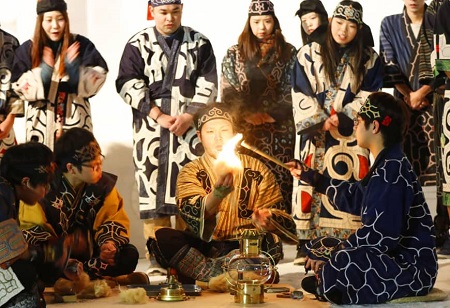Japan’s Cabinet considers legislation recognizing the indigenous Ainu people for first time.
The government approved a bill Friday to recognize the country’s ethnic Ainu minority as an “indigenous” people for the first time, after decades of discrimination against the group.
The Ainu people, many of whom live in northern Hokkaido, have long suffered the effects of a policy of forced assimilation. While discrimination has receded gradually, income and education gaps with the rest of Japan persist.
“It is important to protect the honor and dignity of the Ainu people and to hand those down to the next generation to realize a vibrant society with diverse values,” top government spokesman Yoshihide Suga told reporters.
“Today we made a Cabinet decision on a bill to proceed with policies to preserve the Ainu people’s pride.”
The bill is the first to recognize the Ainu as “indigenous people” and calls for the government to make “forward-looking policies,” including measures to support communities and boost local economies and tourism.
Ainu have lived for centuries on Japan’s northernmost main island of Hokkaido, as well as nearby areas including Sakhalin and the Kuril Islands.
They struggled to pass down their language and culture after the Japanese government implemented an assimilation policy beginning in the Meiji Era (1868–1912), as Japan was modernizing.
The Ainu traditionally observed an animist faith, with men wearing full beards and women adorning themselves with facial tattoos before marriage.
But like many indigenous people around the world, most of Japan’s Ainu have lost touch with their traditional lifestyle after decades of forced assimilation.
The Ainu population is estimated to be at least 12,300, according to a 2017 survey, but the real figure is unknown as many have integrated into mainstream society and some have hidden their cultural roots.
In 1997, a law was enacted aimed at preserving Ainu culture and guaranteeing their human rights, about 100 years after the government introduced the assimilation policy.
It was the first legislation acknowledging the existence of an ethnic minority in Japan, but stopped short of saying the Ainu are indigenous.
The new bill states its purpose is to “realize a society where the Ainu people can live with their ethnic pride, which will be respected” by others. The government will subsidize projects aimed at promoting Ainu culture and organized by local municipalities.
The law would also simplify procedures for Ainu to get permission from authorities to collect timber from national forests for their rituals, and to catch salmon in rivers in a traditional way.
In addition to the new law, the central government also plans to open a national Ainu museum and park in the Hokkaido town of Shiraoi in April 2020.
In 2007, the United Nations General Assembly adopted a declaration on the rights of indigenous people, asking each country to take legislative steps to protect their rights. Japan was among the countries that supported the declaration.
“It is the first step for ensuring equality under the law,” Mikiko Maruko, who represents a group of Ainu people in eastern Japan near Tokyo, said.
“There are lots of things to be done, for example, creating a scholarship for families who struggle to send their children to high schools,” she added, a system currently only available to Ainu in Hokkaido.
“It is a major step forward on policies towards the Ainu people,” said Masashi Nagaura, chief of the Ainu policy bureau of the Hokkaido Prefectural Government that has spearheaded policies for the ethnic minority.
Photo: The sacred torch for the 2017 Asian Winter Games is ignited in Sapporo on Feb. 5, 2017, using a traditional fire-starting method used by the Ainu people, before being lit in the cauldron during the opening ceremony there later that month. Source: KYODO.
| Themes |
| • Discrimination • ESC rights • Historic heritage sites • Human rights • Indigenous peoples • Land rights • Legal frameworks • National • Norms and standards |














